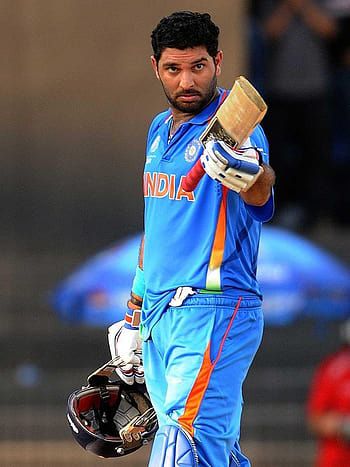Yuvraj Singh: The Hero of Indian Cricket
Introduction:
Yuvraj Singh, popularly known as “Yuvi,” is a name that resonates with glory and resilience in Indian cricket. He is celebrated for his explosive batting, electric fielding, and remarkable all-round abilities. In this blog, we delve into the life and career of Yuvraj Singh, a true hero who overcame challenges and etched his name in the hearts of cricket fans around the world.
Early Life and Rise to Prominence:
Yuvraj Singh was born on December 12, 1981, in Chandigarh, India. Coming from a family with a sporting background, Yuvraj’s talent for cricket was evident from a young age. He made his international debut for India in 2000 and quickly established himself as a promising young talent with his elegant strokeplay and aggressive style of play.
Explosive Batting and All-round Prowess:
Yuvraj Singh’s batting style was a spectacle to behold. He possessed the ability to dismantle any bowling attack with his aggressive strokeplay and powerful hitting. His exceptional hand-eye coordination and timing allowed him to dominate the opposition, especially in limited-overs cricket. Yuvraj’s ability to clear the boundaries with ease earned him the reputation of being one of the most destructive batsmen of his era.
In addition to his batting prowess, Yuvraj was a valuable all-rounder. His left-arm spin bowling provided a useful option for the team, and he often made crucial breakthroughs with his deceptive variations. Yuvraj’s excellent fielding skills, characterized by his agility and athleticism, added an extra dimension to his game.

World Cup Heroics:
Yuvraj Singh’s defining moments came during the 2011 ICC Cricket World Cup. He played a pivotal role in India’s victorious campaign, contributing with both bat and ball. Yuvraj’s heroics included a breathtaking innings of 57 runs and taking two wickets in the final against Sri Lanka. He was awarded the Player of the Tournament for his exceptional performances throughout the event. Yuvraj’s contributions were instrumental in India lifting the World Cup after a gap of 28 years.
Battle with Cancer and Comeback:
In 2011, Yuvraj Singh was diagnosed with a rare form of lung cancer. He underwent rigorous treatment and showed immense courage and determination in his battle against the disease. Yuvraj’s successful recovery and subsequent comeback to cricket were a testament to his fighting spirit and resilience. His return to the cricket field after conquering cancer inspired millions of people around the world.
Legacy and Philanthropy:
Yuvraj Singh’s impact extended beyond the cricket field. He established the YouWeCan Foundation, a charitable organization aimed at creating cancer awareness and supporting cancer survivors. Yuvraj’s personal journey and his foundation’s initiatives have helped in raising funds for cancer treatment and creating awareness about early detection and prevention.
Retirement and Enduring Inspiration:
Yuvraj Singh announced his retirement from international cricket in 2019, leaving behind a legacy of achievements and unforgettable moments. His fearless approach to the game, ability to rise to the occasion, and his triumph over adversity have made him an enduring inspiration for aspiring cricketers and fans worldwide.
Conclusion:
Yuvraj Singh’s cricketing journey is a tale of triumph, courage, and resilience. His explosive batting, exceptional fielding, and all-round abilities made him a force to be reckoned with on the cricket field. Yuvraj’s contributions to Indian cricket, particularly his heroics in the 2011 World Cup, will forever be etched in the memories of cricket enthusiasts. Beyond his cricketing exploits, Yuvraj’s battle with cancer and his philanthropic endeavors have made him a true hero and an inspiration to millions. Yuvraj Singh’s name will always be synonymous with passion, determination, and the spirit of never giving up.
Read This Also: Sachin Tendulkar, Rahul Dravid, Virat Kohli,

